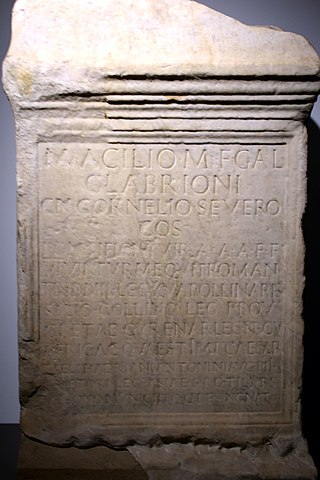Related Research Articles

Decimus Caelius Calvinus Balbinus was Roman emperor with Pupienus for three months in 238, the Year of the Six Emperors.
Lucius Neratius Marcellus was an imperial Roman military officer and senator who held a number of posts in the Emperor's service. Marcellus was elected consul twice, first under Domitian in 95 AD and again under Hadrian in 129. His life provides several examples of how patronage operated in early Imperial Rome.
Quintus Pompeius Falco was a Roman senator and general of the early 2nd century AD. He was governor of several provinces, most notably Roman Britain, where he hosted a visit to the province by the Emperor Hadrian in the last year. Falco achieved the rank of suffect consul for the nundinium of September to December 108 with Marcus Titius Lustricus Bruttianus as his colleague.
Quintus Pompeius Senecio Sosius Priscus was a Roman senator who was appointed consul during the reign of Marcus Aurelius.

The gens Coelia, occasionally written Coilia, was a plebeian family at ancient Rome. The Coelii are frequently confounded with the Caelii, with some individuals called Caelius in manuscripts, while they appear as Coelius or Coilius on coins. The first of this gens who obtained the consulship was Gaius Coelius Caldus in 94 BC.
Titus Sextius Lateranus was a Roman senator active in the second century AD. He was ordinary consul in the year 154 as the colleague of Lucius Verus. Lateranus is also known by a more full name, which has been restored in two different ways: Titus Sextius Lateranus M. Vibius Ovel[lius?...] Secundus L. Vol[usius Torquatus?] Vestinus, or Titus Sextius ... M. Vibius Qui[etus?] Secundus L. Vol[usius Torquatus?] Vestinus.
Lucius Catilius Severus Julianus Claudius Reginus was a Roman senator and general active during the reigns of Trajan and Hadrian. He was appointed consul twice: the first time in 110 CE with Gaius Erucianus Silo as his colleague; the second in the year 120 with the future emperor Antoninus Pius as his colleague. Catilius was also the step-great-grandfather of the emperor Marcus Aurelius.

Manius Acilius Glabrio Gnaeus Cornelius Severus was a senator of the Roman Empire. He was consul ordinarius in 152 with Marcus Valerius Homullus as his colleague. Acilius Glabrio is known almost solely from surviving inscriptions.
Quintus Glitius Atilius Agricola was a Roman senator and general who held several posts in the emperor's service. He was twice suffect consul: for the first time in AD 97 with Lucius Pomponius Sura as his colleague, and the second time in 103 when he replaced the emperor Trajan. He is the last known person to have held two suffect consulates. Agricola is known only through a large number of fragmentary inscriptions from Augusta Taurinorum, which appears to be his home town.
Lucius Dasumius Tullius Tuscus was a Roman senator who was an amici or trusted advisor of the emperors Antoninus Pius and Marcus Aurelius. He was suffect consul in the nundinium of April to June 152 AD as the colleague of Publius Sufenas.

Gaius Minicius Fundanus was a Roman senator who held several offices in the Emperor's service, and was an acquaintance of Pliny the Younger. He was suffect consul in the nundinium of May to August 107 AD with Titus Vettennius Severus as his colleague. Fundanus is best known as being the recipient of an edict from the emperor Hadrian about conducting trials of Christians in his province.
Publius Manilius Vopiscus Vicinillianus was a Roman senator of the 2nd century AD, who was ordinary consul for the year 114 as the colleague of Quintus Ninnius Hasta.
Gnaeus Domitius Lucanus was a Roman senator and military commander active in the first century AD. His full name is Gnaeus Domitius Afer Titius Marcellus Curvius Lucanus. He was suffect consul sometime between 76 and 78.
Lucius Roscius Aelianus Maecius Celer was a Roman senator of the second century. He was suffect consul in the nundinium of November-December AD 100 with Tiberius Claudius Sacerdos Julianus as his colleague. Celer is primarily known from inscriptions.
Publius Cornelius Dexter was a Roman senator and general active during the middle of the second century AD. He was suffect consul for the nundinium July-September 159; the name of his colleague is not known. Dexter is known only from non-literary sources.
Publius Pactumeius Clemens was a Roman senator and jurisconsult active during the first century AD. He was suffect consul for the nundinium April-June 138 as the colleague of Marcus Vindius Verus; according to Ronald Syme, Clemens is the earliest known consul to hold the fasces in absentia. Although he is known mostly through inscriptions, his life provides examples of how patronage operated during contemporary Rome.
Gaius Eggius Ambibulus was a Roman senator active in the second century AD. He was ordinary consul for 126 as the colleague of Marcus Annius Verus; Lucius Valerius Propinquus replaced Verus by 1 March and was his colleague for the remainder of the first nundinium of that year. Ambibulus is known only through inscriptions.
Quintus Caecilius Marcellus Dentilianus was a Roman senator, who held several imperial appointments during the reign of Antoninus Pius. He was suffect consul in an undetermined nundinium around AD 150. He is known entirely from inscriptions.
Publius Metilius Secundus was a Roman senator, who was active during the reign of Hadrian. He was suffect consul in one of the earlier nundinia of 123 as the colleague of Titus Prifernius Geminus. He is known entirely from inscriptions.
The gens Vibullia, occasionally written Vibulia, was a minor plebeian family at ancient Rome. Members of this gens first appear in history in the years following the Third Samnite War, but after this they are hardly mentioned until the end of the Republic, at which time they were of senatorial rank. A wealthy family of this name rose to prominence at Athens during the latter part of the first century. Others are known from inscriptions.